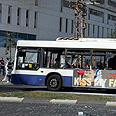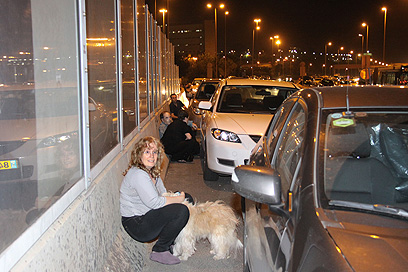
Becoming Israeli during Gaza operation
Op-ed: New olah recounts first experience as Israeli living under threat of bus explosions, missiles
I am an eight-month old Israeli. I am a 23-year old human being, but it was only four months ago that I wrote my first Aleph, and through dedication I have achieved an infant's comprehension level. I feel a certain affinity with the toddlers I see playing outside the public bomb shelter behind my apartment. Operation Pillar of Defense changed how we view the world.
Like most Israeli children, I have kissed loved ones goodbye when they went to the army, but I had only experienced war as a voyeur.
When Netanyahu announced on television, "something something war, something something rockets and missiles, something something Hamas," I watched with anxious anticipation, wondering what it all meant. When sirens echoed in Tel Aviv, the young children and I were lead by the hand, running towards the shelter. We asked one-word questions about the explosions. "What?" "Why?" It was the first time I felt my heart pounding so hard that I could hear it, could count its rapid-fire beats.
Then a bus blew up during my commute to ulpan. We were told to stay inside the ulpan, because there was a terrorist outside trying to kill someone, or many. I felt nauseous. All day I couldn't stand the sight of food. My stomach kept churning. Worries scampered around my brain. When next? Where next? There was nothing I could do, these were pointless concerns. We all sat and waited for the phone to ring, tried to pay attention to homework (ya right).
Riding the bus home after ulpan was intoxicating, with its own kind of vertigo. Like standing with a blindfold on and your toes curled over the edge of a cliff. Only you can't even choose to jump or step away from the edge. You are suspended in that state, unable to predict anything around you but the adrenaline pulsing beneath your skin.
That night I went to a new restaurant by my house where a Moroccan mother makes soup. It would take a master cook to tempt me to eat. An ambulance drove by, sirens blaring. I rushed to the TV on the wall in the tiny restaurant; it showed buildings exploding in Gaza. I asked an old man behind me: "Is there news? Did something happen?"
He said: "Everything’s fine."
Suddenly I found myself screaming at him: "EVERYTHING IS NOT ALRIGHT!"
Why did seeing an ambulance make me feel like I’d just sprinted for miles, my breath coming too quickly, my face hot and heart racing? The man didn't try to comfort me, or tell me not to worry. He jutted his chin out and tilted his face up towards the sky. I lovingly call this gesture "the chin." I’ve come to understand what it means: "What do you want from me? This is how it is." If I say that Tel Aviv is too expensive and someone replies with this gesture, I always tease: "Don't give me the chin. I hate it when Israelis give me the chin. There must be something we can do."
But when this old man replied to my terror with "the chin," I started to cry.
I am usually a very polite person, which, frankly, sets me apart here in Israel. But since Operation Pillar of Defense began, I've shouted at a stranger in public and argued politics with everyone. For the first time I stopped answering contrary opinions with "That’s interesting." Instead, I disagreed with my friends, loudly, and relished the release. I became more Israeli over those eight days than I had over the previous eight months.
By Thanksgiving, everything had changed. On the second day of the operation, during ulpan, we learned the verb "to thank." And each student had to say what he was thankful for. One by one, students of all ages from Russia, Belarus, Ukraine, Mexico and Italy, said: "I am thankful to the IDF."
And I, a liberal, secular Jew of mixed ethnicity from California, very-anti military force for any reason, echoed the same sentiment that Israeli children across the country also probably learned for the first time. "I am grateful to the IDF for protecting us."
Leigh Cuen is a freelance journalist from California. She has written for Women's eNews, the San Francisco Public Press, the Palestinian News Network, J. weekly newspaper, World Literature Today, the Earth Island Journal and many others. Follow her work at http://leighcuen.tumblr.com or @La__Cuen











